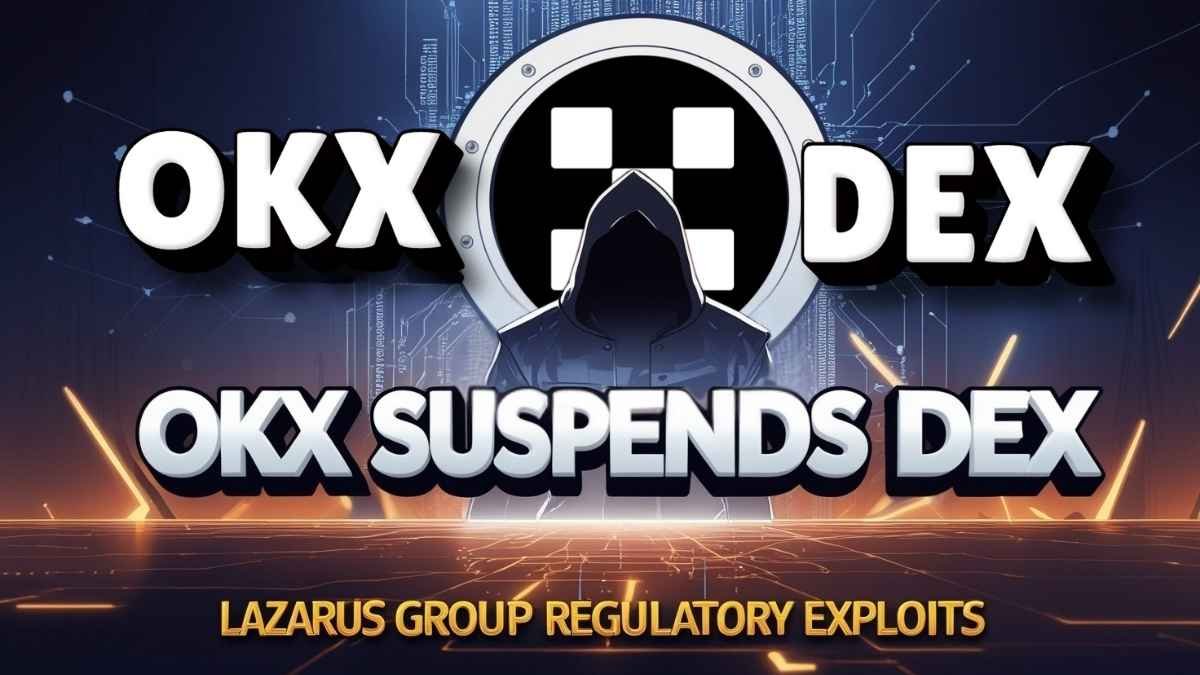By Ethan Carter
The Crypto exchange OKX announced a suspension of its DEX aggregator services because Lazarus Group security risks from North Korea combined with increased EU regulatory oversight.
OKX implemented this action after its DeFi services drew accusations about hackers using them to cleanse funds from the Bybit hack described as one of history’s largest centralized exchange breaks which lost $1.5 billion. The exchange emphasizes this action as a preventive measure that permits the organization to deploy security upgrades and work closely with regulators.
Strategic Retreat or Forced Compliance?
An official statement from OKX on Monday explained that the company began implementing “proactive measures” based on regulatory consultations and aimed for strengthening precautions against unlawful financial operations.
Our analysis revealed Lazarus Group had started a coordinated campaign aimed at abusing DeFi services. The exchange revealed that it found both competitive attack attempts and Lazarus Group’s coordinated effort which targeted its work.
Regulatory pressure from the EU may have been the main factor or OKX’s temporary service closure alongside maintaining compliance with existing rules.
EU Watchdogs Turn Up the Heat
OKX made its announcement following an EU investigation of its decentralized trading along with self-custody services as Bloomberg reported their non-compliance with Markets in Crypto-Assets (MiCA) regulations. OKX On X.

The upcoming MiCA regulation seeks to regulate crypto platforms through strict oversight because it targets monetary crimes committed through decentralized finance (DeFi) protocols. Regulators now scrutinize OKX services that previously received praise as decentralized solutions because they believe these services could facilitate criminal activities by cybercriminals and rogue nation-states.
The possible non-compliance of OKX’s DEX aggregator services by the EU would establish a regulatory standard that could lead authorities to target additional DeFi platforms throughout the region.
The Bybit Hack Triggered a Negative Consequence That Prompted OKX’s Unwanted Interaction
The OKX DEX aggregator service recently put itself into pause mode following the $1.5 billion hacking incident that Bybit experienced just weeks ago which analysts attribute to North Korean Lazarus Group.
Bybit CEO Ben Zhou announced that $100 million worth of stolen funds flowed through OKX’s Web3 proxy which created worries about DeFi enabling illegal transactions. OKX encountered regulatory scrutiny and security evaluation after this announcement while officials increased their demands for DeFi protocol regulation.
Growing Pattern of Exploits
The Lazarus Group as a notorious state-sponsored cybercrime syndicate uses decentralized finance to hide stolen funds by evading sanctions in order to support North Korea’s nuclear program. Several major cryptocurrency breaches which stolen billions from Atomic Wallet defending attacks against Stake.com and Alphapo among others have been identified as the work of the group during the last 12 months.
- OKX now joins previous decentralized networks as a target for the Lazarus Group making investors wonder if such platforms can stop such exploits from recurring.
- The path forward for OKX involves managing regulatory restrictions in order to protect its business operations.
OKX has suspended its DEX aggregator although the exchange specified via Monday X (Twitter) that client wallets will maintain complete functionality. The service will prevent further wallet creation within designated regulatory zones unless specified regulatory conditions change.
The crypto industry shows increasing adherence to global financial regulations through this development of once-unregulated DeFi services.
OKX’s wallet services remain operational but new wallet creation is temporarily disabled in designated regions.
OKX’s move raises big-picture concerns:
- Worldwide regulatory controls for DeFi systems appear to start their existence now.
- The adoption of MiCA and additional regulatory constructs will affect whether alternative decentralized networks need to implement similar controls.
- Defi platforms need to find ways to uphold decentralization principles while following compliance requirements while maintaining their essential core functionalities.
OKX’s period of service discontinuation can potentially shape upcoming strategies for top DeFi platforms to handle governmental restrictions in an emerging regulatory environment. Regulatory tightness and hacker development of new decentralized platform vulnerabilities indicate ongoing challenges for innovation versus security and regulatory compliance.
Via our official WhatsApp platform subscribers can access all the latest crypto market analysis together with blog trends and news updates. See this link to register. Communication happens without comment while algorithms do not operate and your private details remain invisible to all observers.








